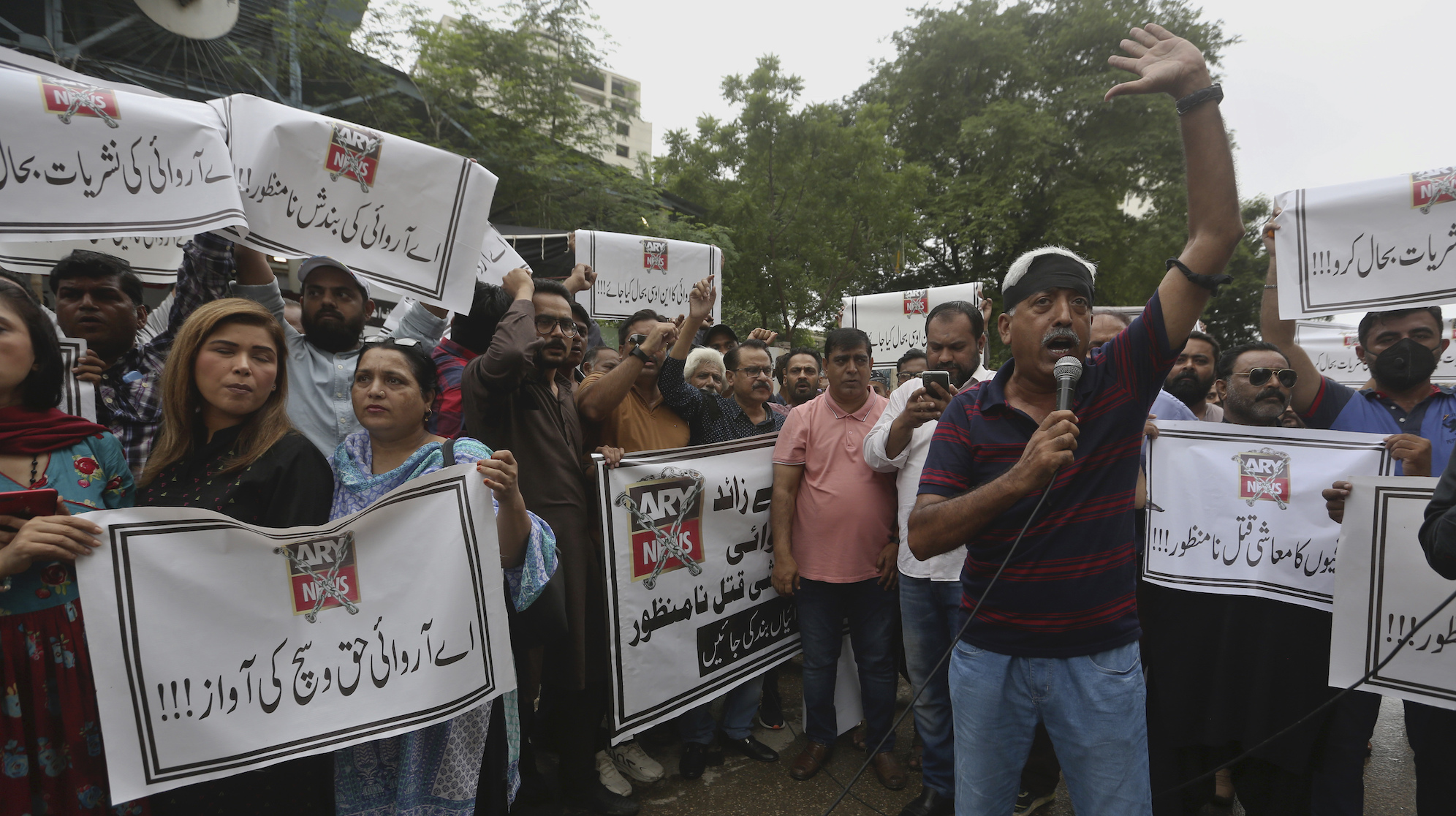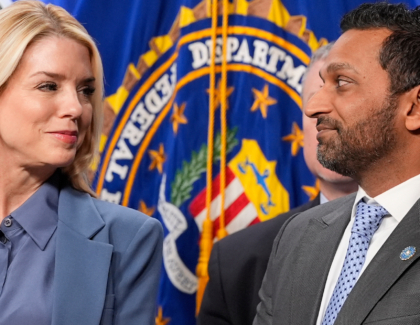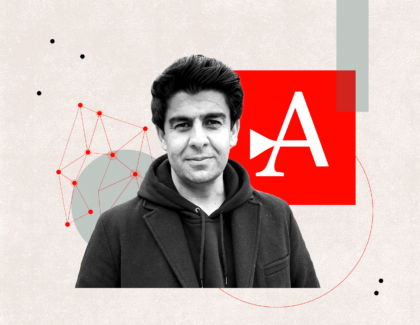Sign up for the daily CJR newsletter.
“The channel is currently unavailable. Sorry for the inconvenience.” Two weeks ago, this was the message that some viewers in Pakistan saw in place of the regular broadcast of ARY News, a popular network that had just been taken off the air at the instruction of Pakistan’s media regulator. ARY was suspended after remarks made on its air by Shahbaz Gill, a top aide to Imran Khan, the international cricket star turned politician who was ousted as Pakistan’s prime minister following a parliamentary no-confidence vote earlier this year but is now surging again in opposition, rallying street support behind his claims that Pakistan’s military conspired with the US to get rid of him. Gill accused the government that succeeded Khan’s of working to turn the military against Khan’s party, then addressed members of the security services, urging them to follow their “values” rather than “illegal” orders. “You are not a madman or an animal,” Gill said.
As Reporters Without Borders noted, while ARY has tended to support Khan’s party and criticize the new government, it made it clear that Gill was speaking for himself, not the network; nonetheless, the regulator punished the network for the comments, which it deemed “hateful and seditious,” not only pulling ARY off the air but revoking its broadcast license and pursuing its staff. In the days after Gill spoke, authorities detained Ammad Yousaf, a top ARY executive (he was later released), and put out warrants for the network’s owner, a producer, and various anchors, at least two of whom subsequently left the country. Gill was arrested, too: according to the Washington Post, he “was detained for days until a judge ordered him to be transferred to a hospital for medical reasons,” at which point “he was carried out on a stretcher after a dramatic three-hour standoff outside the prison gates between two police departments that both claimed jurisdiction.” Officials insisted that Gill was merely suffering from a flare-up of chronic asthma. Gill’s lawyer said that he had been tortured, including “in his private parts.”
ICYMI: The horribly timed defenestration of Brian Stelter
On Saturday, Khan called his supporters to a rally in protest of Gill’s treatment, during which Khan railed against police officers and a judge involved in Gill’s case and threatened to pursue legal action against them, promising, “We will not spare you.” The next day, authorities charged Khan under terrorism laws, accusing him of intimidating officials. He has yet to be arrested—Pakistani law allows for pre-detention bail—but he might be in the coming days; his supporters have vowed to stop that from happening, with one Khan aide warning the New York Times that any arrest “will result in a nationwide revolt.” The media regulator, meanwhile, has moved to ban TV networks from airing Khan’s speeches live going forward. (Broadcasting with a delay is apparently allowed.) When Khan tried to go live on YouTube, access to that was disrupted, too.
Things were once very different. When Khan became prime minister four years ago last week, he did so with the backing of the military, which is a preeminent powerbroker in Pakistani politics (though it has long denied interference). In the months before Khan took office, opponents accused the military of waging a campaign of repression in support of Khan; when a TV network went off air across swaths of the country, it was not ARY but Geo News, which had reported critically on the military and was considered relatively hostile to Khan. On that occasion, the media regulator said it had nothing to do with the blackout. According to the Times, the move was “widely seen as being forced by the military” (though Geo “took pains not to publicly blame the military” and the military didn’t comment).
After Khan took office, he and his supporters weaponized the security and judicial establishments to “harass and silence journalists and political opponents who criticized him,” as the Times recently put it. On Khan’s watch, reporters were regularly detained and TV channels were sometimes blocked—including Geo, again, during an official visit by Khan to the US. When a representative of the Committee to Protect Journalists tried to visit Pakistan in 2019, he was blacklisted and deported. Khan’s government put forward or passed various laws that were criticized by media-watchers, quietly tightening rules and penalties around online speech, slipping journalistic “obligations” into a law nominally aimed at protecting journalists, and proposing to centralize all press regulation under a single body. In 2019, Khan personally filed a defamation complaint against a TV commentator whose show was subsequently canceled, apparently following threatening anonymous phone calls; in 2020, Khan slammed two media companies that were, around the same time, frozen out of government ad spending. In all, during Khan’s tenure, Pakistan slid around twenty places down RSF’s World Press Freedom Index; it now sits 157th out of a hundred and eighty countries worldwide. Last year, RSF named Khan to its list of “press freedom predators”—the first time it had done so for a civilian Pakistani prime minister.
Pakistan also remained a physically dangerous country for journalists under Khan’s leadership; at least eighteen journalists were killed there between Khan taking office and the end of last year. The reasons for these murders appear to have been diverse: some of those killed had covered crime; another had been threatened by local opposition politicians and police; in one case, an ethnic separatist group claimed responsibility. But critics accused Khan of overseeing a persistent broader culture of impunity for attacks against journalists. In 2018, Pakistan sat in ninth place on CPJ’s annual global impunity index. It held the same spot as of last year.
Such threats to Pakistani journalists long predated Khan and have already outlasted him: in just one week across late June and early July, at least two journalists were killed and at least two others attacked, with one, a veteran political commentator, dragged from his car and beaten one day after he criticized both Khan and Shehbaz Sharif, Khan’s successor as prime minister. Last year, while in opposition, Sharif visited Asad Ali Toor, a journalist and YouTuber, to express solidarity after Toor was bound and gagged and beaten in his home; after taking power, Sharif described Khan’s status as an RSF “predator” as “shameful,” and Sharif and his government pledged to respect press freedom, including by scrapping Khan’s plan to centralize media regulation. That same government, of course, has since forced ARY off the air, and been more broadly accused of going after journalists who are sympathetic to Khan. As RSF notes in its Pakistan country file, “political parties in opposition support press freedom but are first to restrict it when in power.”
If Pakistani governments alternate amid tumultuous lurches in the balance of power, journalists seem always to get caught in the middle to some extent. Another, omnipresent force bears on their work, too: the military, which has long been accused of direct and indirect modes of censorship, whether ruling unilaterally, as it has done on several occasions since Pakistan came into being in 1947, or exerting influence over the civilian administration of the day. In the two months after Sharif succeeded Khan this year, RSF recorded nine cases in which journalists who criticized the military were harassed. This month, after ARY was taken off air following Gill’s anti-military remarks, RSF’s Daniel Bastard said that onlookers should “not be fooled. Although the current government must be held responsible for the latest attacks against the media, it is the military that intervenes behind the scenes to bring Pakistan’s journalists to heel.”
Last year, with Khan still in power, Hamid Mir—a prominent anchor on Geo News who, in 2014, survived despite being shot six times—attended a rally in solidarity with Toor, his fellow journalist, after the latter was attacked. At the rally, Mir strongly condemned Pakistan’s military and its treatment of the press. A few days later, Geo took Mir’s show off the air. Mir said that network bosses told him to clarify or retract his remarks. He was subsequently accused of sedition, and remained off air for months.
Last week, Mir wrote a column for the Washington Post to mark the seventy-fifth anniversary of Pakistan’s independence, and warned that while the country’s army “remains strong,” its democratic institutions—including the media—are “becoming weaker by the day.” Specifically, Mir called out Sharif’s hypocrisy in supporting press freedom in opposition then banning ARY after taking office. “When I was facing sedition allegations last year, ARY commentators wanted to see me behind bars,” Mir noted; one of its anchors declared him an “enemy” of Pakistan. “My former critics are now facing similar allegations,” Mir continued. “I don’t support silencing them.”
Below, more on press freedom in Pakistan and Asia:
- Pakistan, I: After blocking ARY, Pakistan’s media regulator also blocked transmission of BOL News, a network that has itself been described as favorable to Khan. Over the weekend, officials arrested Jameel Farooqui, a journalist with BOL, after he alleged on his YouTube channel that police officers sexually and physically abused Gill, the Khan aide; Farooqui has now been charged with defamation and obstructing public officials. Meanwhile, Imran Riaz, an anchor with Express News who has criticized Sharif’s government and voiced support for Khan, was also recently arrested by the authorities. Per Mir, his network has since taken him off the air even though charges were not filed.
- Pakistan, II: In 2019, the journalist and novelist Mohammed Hanif wrote for CJR about press freedom in Pakistan, which, Hanif said, was “enduring its darkest phase yet.” Hanif recalled Pakistani intelligence officials asking to meet with him to explain why he’d traveled to Bangladesh for a literary festival after publishing his first novel. “I was comforted by the illusion that I could write pretty much anything I wanted in the guise of fiction,” he wrote, “but then I found myself reciting my novel to two intelligence officers.”
- Afghanistan: Last week, security guards in Afghanistan detained Ivor Shearer, a US filmmaker, and Faizullah Faizbakhsh, an Afghan producer, after stopping them from filming in a neighborhood in Kabul where a US drone strike recently killed the Al Qaeda leader Ayman al-Zawahiri; according to CPJ, the guards then called Taliban intelligence, which sent fifty armed operatives to blindfold Shearer and Faizbakhsh and take them to an undisclosed location. (CPJ reported on the pair’s case on Friday, at which point they remained in detention. It’s unclear where they are now.)
- The Philippines: For Nikkei, Cliff Venzon profiled Manuel Villar—the richest man in the Philippines and a key backer of both former president Rodrigo Duterte and Duterte’s successor, Ferdinand Marcos Jr.—who is getting into the media business by launching TV and radio stations, including on channels that used to belong to ABS-CBN, an independent broadcaster that was targeted by Duterte. Villar’s entry into the media industry “shows how business and politics often go hand in hand in the Philippines,” Venzon writes. (ICYMI, I wrote about Marcos and the press in this newsletter in May.)
Other notable stories:
- Anthony Fauci, Biden’s top covid adviser and the director of the National Institute of Allergy and Infectious Diseases, confirmed yesterday that he will step down in December after fifty-four years of federal service, and gave interviews about his decision to several major outlets. He does not plan to retire completely, with writing among the things on his to-do list; he already started working on a memoir, but has said that he can’t find a publisher while a federal employee. (ICYMI, I spoke with Fauci last year for CJR’s issue on the media and covid. You can also listen to our conversation here.)
- Reporters from the Times followed Eric Adams, the mayor of New York, at night for thirty days to piece together his movements across the city’s nightlife scene, and found that he keeps returning to a Manhattan restaurant run by friends with a “trail of legal troubles.” At the restaurant, reporters “never observed him paying for his meals,” the Times reports; Adams says he settles up afterward, but would not provide receipts. Adams has said he is vegan, but a waiter has been heard referring to a fish dish as his usual.
- In media-jobs news, Allison Benedikt, the former executive editor of Slate, is joining the Times opinion section as editorial director, a newly created role. Adam Entous, a staff writer at The New Yorker, is also joining the Times, as an investigative reporter. And The New Yorker reshuffled its leadership team, promoting Jessica Henderson to managing editor to replace Leily Kleinbard, who becomes executive managing editor, a new role.
- Late last week, the Washington Baltimore News Guild revealed, in a legal complaint, that editors at the Post suspended Paul Farhi, a media reporter, earlier this year after he tweeted that the paper would remove bylines from stories written in Russia to protect its journalists there. Editors accused Farhi of jeopardizing his colleagues’ safety; the News Guild has countered that he was just doing his job. Washingtonian has more details.
- Andrew R.C. Marshall and Joseph Tanfani, of Reuters, dived into BitChute and Odysee, video platforms that have taken off “as YouTube, Twitter, and Facebook tighten rules to combat misinformation and hate speech.” The sites “promote themselves as free-speech havens,” Marshall and Tanfani write, and are “at the forefront of a fast-growing alternative media system that delivers once-fringe ideas to millions of people worldwide.”
- Recently, Lachlan Murdoch, the CEO of Fox Corp and son of Rupert, threatened to take legal action against Crikey, an Australian news site, over an article describing “the Murdochs and their slew of poisonous Fox News commentators” as “unindicted co-conspirators” in Trump’s attempts to overthrow US democracy. Now Crikey is publicly daring Lachlan to defend his position in court. The Sydney Morning Herald has more.
- Emily Maitlis, a former star BBC interviewer (who memorably dissected Prince Andrew), and Jon Sopel, the BBC’s former North America editor, spoke with The Observer about leaving the broadcaster to set up a podcast, and reflected on the BBC’s strict impartiality rules. Sopel said he thinks the BBC has “ducked” covering the consequences of Brexit, while Maitlis said she gets “nervous” when impartiality is used to “shut down journalists.”
- And last week, David Vassegh, who covers the Los Angeles Dodgers baseball team for SportsNet LA, took a televised trip down a slide used by the Milwaukee Brewers’ mascot and wound up with a broken wrist and six cracked ribs. Vassegh then taped an interview before seeking medical attention. (Teddy Roosevelt, eat your heart out.) He underwent wrist surgery yesterday. He should have read the Slide Instruction Manual.
ICYMI: Lagipoiva Cherelle Jackson on the human face of climate disasters in the Pacific
Has America ever needed a media defender more than now? Help us by joining CJR today.







